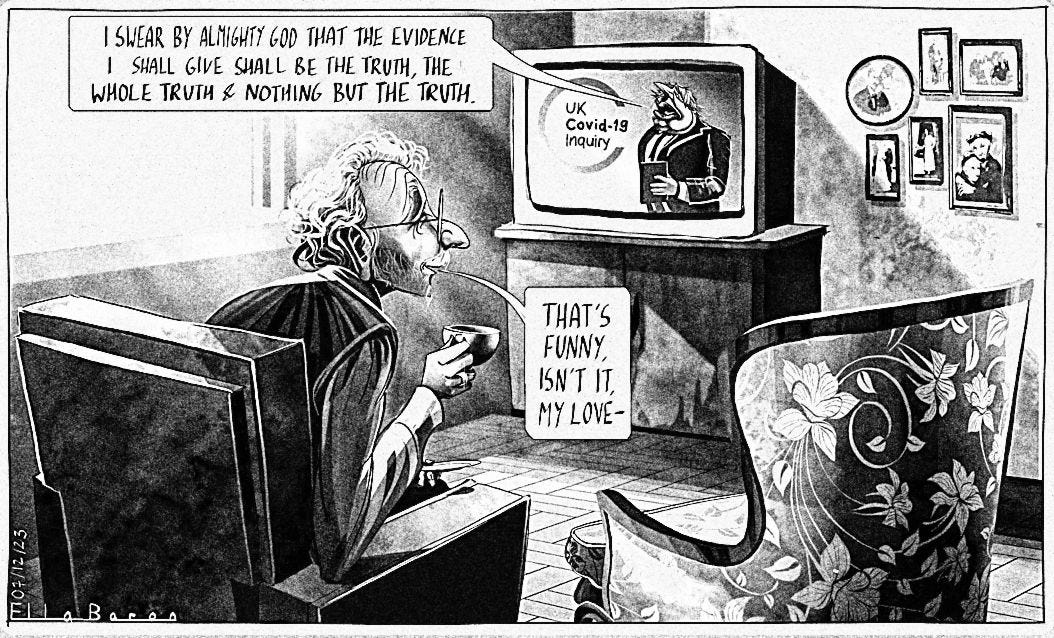COVID Inquiry Finds Lockdowns Were Terrible, While Reporters Call Bullshit on Government’s Lead Academic Advisor
BBC gets its pants pulled down, ass paddled for spreading COVID misinformation.
5 minute read
While America has chosen to ignore most COVID policy failures, unless they can be used to score partisan political points, the British government has been running a COVID Inquiry, examining mistakes the government made to better prepare for the next pandemic. The proceedings took an interesting turn in recent days, when top government advisor Mark Woolhouse at the University of Edinburgh lambasted the BBC for misrepresenting COVID risks to promote harmful lockdowns, while senior government advisor Devi Sridhar, also at the University of Edinburgh, kind of admitted that she maybe, perhaps gave poor advice—alerting several reporters who began calling her out on social media and documenting her blatant lies.
The statements by both academics underscore that lockdowns failed as a pandemic policy but were enforced with the help of media who, instead of challenging government policies, began promoting them.
“I find it extraordinary that no formal assessment of the expected impact of lockdown was implemented,” testified Woolhouse, who studies infectious disease epidemiology, and advises the Scottish government on pandemics. “This despite it being obvious that lockdown was likely to cause severe harms to the economy, education, mental health, health care access and societal well-being … exacerbating inequalities.”
Government advice on pandemics did not “consider the wider harms caused by the response to the pandemic” such as government policies that led to school closures and the banning of outdoor activities, even though the virus did not transmit well outdoors, Woolhouse said. He added that the risk of a child dying from COVID was “about the same as the risk of that child being struck by lightning in the playground” causing the government to ignore that the virus was “ten thousand times” more deadly to the elderly.
“In the media, the BBC television news repeatedly reported rare deaths or illnesses among healthy adults as if they were the norm, again creating a misleading impression of who was at greater or lesser risk,” Woolhouse testified. “I suspect this misinformation was allowed to stand throughout 2020 because it provided a justification for locking down the entire population.”
In fact, the BBC ran a fact check in early 2021 that promoted lockdowns, and the BBC’s much derided “disinformation reporter” Marianna Spring wrote an article months later that compared lockdown critics to climate denialists:
Anti-lockdown and anti-vaccine Telegram groups, which once focused exclusively on the pandemic, are now injecting the climate change debate with the same conspiratorial narratives they use to explain the pandemic.
The posts go far beyond political criticism and debate - they're full of incorrect information, fake stories and pseudoscience.
Ignoring their complicity in promoting government mistakes, the BBC focused coverage on Woolhouse’s criticism of harmful policies such as school closures and lockdowns, while other outlets, such as The Telegraph, headlined barbs Woolhouse shot at the BBC.
Reporters call bullshit on Scottish top advisor
Another high point of the government’s COVID inquiry involved Devi Sridhar, a professor of global health who closely advised Scotland’s leader during the pandemic. Sridhar now claims that she didn’t advise the government on “Zero COVID” policies to eliminate the virus—policies that all experts now agree were harmful.
In a rambling explanation that stretches on for several pages of transcript, Sridhar testified that she was for Zero COVID, but not really, but “yes” she was—confusing the inquiry counsel, who was forced to ask additional questions to get Sridhar to clarify her position. Several times.
“So your position—thank you for that,” said the inquiry counsel at one point. “Could I make another—repeat my plea on behalf of the stenographer?”
But Sridhar’s evasions did not confuse journalists who had interviewed her in the past. Reporter Deborah Cohen posted on X that Devi Sridhar harassed her while being questioned about Zero COVID for a BBC documentary, in the early months of the pandemic.
“I remember it made me look like some oddball COVID denier,” Cohen wrote.
UnHerd’s editor-in-chief Freddie Sayers also seemed unable to control himself over Sridhar’s denial of her former stance promoting Zero COVID, and reposted his interview with Sridhar in which she argued for almost an hour in favor of Zero COVID.
“This wasn't coming from a kook with no influence,” Sayers wrote. “Sridhar had more TV appearances than any other ‘expert’ by a wide margin, and was an official advisor to the Scottish govt.”
“It will always be terrifying how people like that, so divorced from reality and attracted to authoritarian fantasy, were elevated to positions of such influence during the crisis,” Sayers added.
And on and on we go.
Many “follow the science” narratives that academics beat into our heads during the pandemic are melting away as people poke at them and ask questions—questions that seldom get answers. It’s an interesting process, watching myths come unspooled.
Obnoxious as hell. But fun to watch.







We pay our BBC licence fee, but we stopped watching BBC TV many months ago. We used to listen to news regularly on Radio 4 and our local Radio Ulster. Not any more. I can't help sharing your sense of glee when reading about the COVID inquiry.
Canada is the same as US. There will never be an admission of wrongdoing or what could have been done differently during COVID. Absolute smug silence.